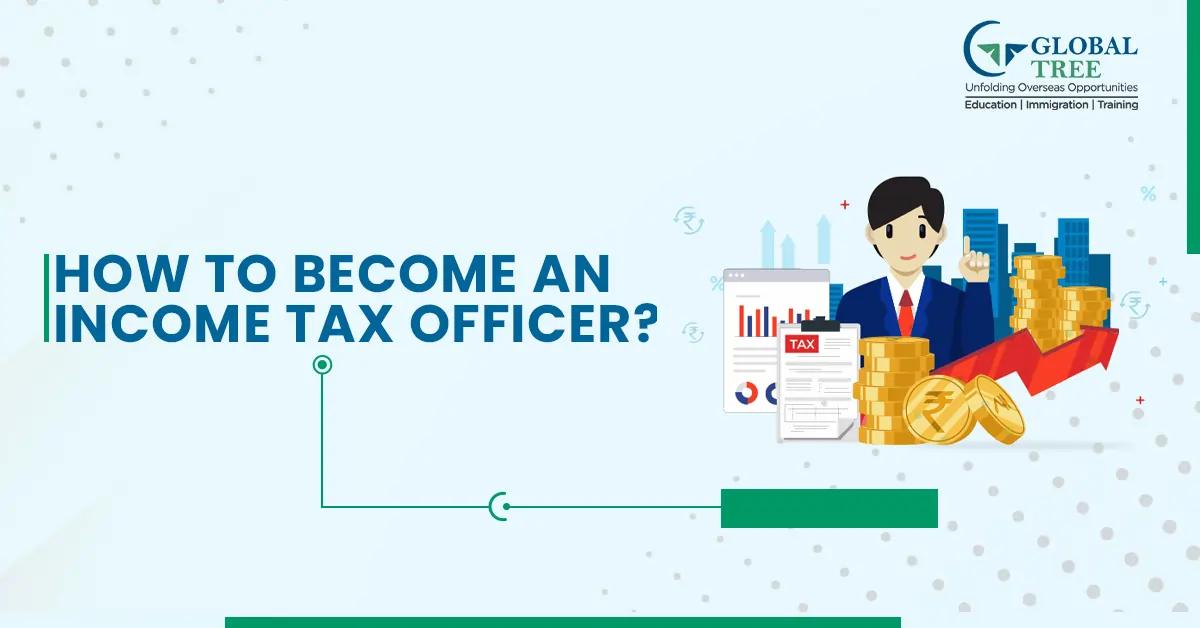How to Become an Income Tax Officer?

- Introduction
- Who is an Income Tax Officer (ITO)?
- How to Become an Income Tax Officer?
- Qualifications Required for an Income Tax Officer
- Salary of an Income Tax Officer
- SSC CGL Income Tax Inspector Exam
- SSC CGL Eligibility
- SSC CGL Syllabus & Selection
- SSC CGL Cut-Offs
- Income Tax Inspector Selection Process
- Training Process for Group “B” Post
- How to Become an Income Tax Officer Through UPSC Path?
- Role of an Income Tax Officer
- Perks of an Income Tax Officer
- FAQs
Introduction
The role of an Income Tax Officer (ITO) in India is one of prestige, responsibility, and significant authority. As a crucial part of the Income Tax Department, an ITO plays a vital role in ensuring the collection of taxes, monitoring tax fraud, and enforcing tax laws. For those aspiring to a career in the civil services, becoming an Income Tax Officer offers a promising path with opportunities for growth, stability, and public service.
Who is an Income Tax Officer (ITO)?
An Income Tax Officer (ITO) is a government official responsible for assessing, collecting, and managing taxes from individuals and businesses. ITOs ensure that citizens comply with tax laws and regulations, investigate tax evasion cases, and take necessary actions to recover unpaid taxes. This role requires a deep understanding of tax laws, analytical skills, and the ability to handle complex financial situations.
How to Become an Income Tax Officer?
To become an Income Tax Officer in India, there are primarily two pathways:
Through the Staff Selection Commission Combined Graduate Level (SSC CGL) Examination: This is the most common route for becoming an Income Tax Inspector, who can later be promoted to an Income Tax Officer.
(Read More: Study Tax Accounting Course abroad)
Through the Union Public Service Commission (UPSC) Examination: Candidates can also enter the Indian Revenue Service (IRS) through the UPSC Civil Services Examination, where they can eventually rise to the position of an Income Tax Officer.
Qualifications Required for an Income Tax Officer
To pursue a career as an Income Tax Officer, certain educational qualifications and skills are required:
- Educational Qualifications:
- A Bachelor’s degree in any discipline from a recognized university or institution is mandatory.
- While there is no specific degree required, candidates with a background in commerce, finance, law, or accounting may find it beneficial.
Age Limit:
- The minimum age for SSC CGL candidates is 18 years, and the maximum age is 30 years. Age relaxations are provided for candidates belonging to reserved categories.
Physical Fitness:
- Candidates must take care of the body, as the job involves fieldwork, including searches and seizures.
Other Skills:
- Strong analytical abilities, attention to detail, good communication skills, and a thorough understanding of tax laws and regulations are essential.
Salary of an Income Tax Officer
The salary of an Income Tax Officer is attractive and increases with experience and promotions. The pay scale is structured as follows:
Basic Pay: The basic pay for an Income Tax Officer starts at around INR 44,900 per month.
Allowances: In addition to the basic pay, officers are entitled to various allowances, including:
- Dearness Allowance (DA)
- House Rent Allowance (HRA)
- Transport Allowance
- Medical Allowance
Grade Pay: The grade pay for an Income Tax Officer is approximately INR 4,600.
In-Hand Salary: After adding allowances and deductions, the in-hand salary of an Income Tax Officer ranges from INR 55,000 to INR 70,000 per month.
Promotions and Increment: With experience and performance, an Income Tax Officer can be promoted to higher positions like Assistant Commissioner, Deputy Commissioner, and Commissioner of Income Tax, which significantly increases the salary and benefits.
(Note: How to effectively manage your finances?)
SSC CGL Income Tax Inspector Exam
The SSC CGL exam is a highly competitive examination conducted by the Staff Selection Commission to recruit candidates for various posts in government departments, including the post of Income Tax Inspector, which is the entry-level position in the Income Tax Department.
SSC CGL Eligibility
To be eligible for the SSC CGL exam, candidates must fulfill the following criteria:
- Educational Qualification: A Bachelor's degree from a recognized university.
- Age Limit: The general age limit is between 18 to 30 years, with age relaxation for reserved categories.
SSC CGL Syllabus & Selection
The SSC CGL exam is conducted in four stages:
- Tier 1: Computer-based examination covering General Intelligence and Reasoning, General Awareness, Quantitative Aptitude, and English Comprehension.
- Tier 2: Computer-based examination with papers on Quantitative Abilities, English Language and Comprehension, Statistics, and General Studies (Finance and Economics).
- Tier 3: Descriptive paper in English or Hindi, which can include essay writing, precis, application, etc.
Note: If you are preparing for the GRE, focus on writing a perfect GRE Argument Essay that will boost your score.
- Tier 4: Skill Test or Computer Proficiency Test (CPT) and Document Verification.
The final selection is based on the cumulative score of Tier 1, Tier 2, and Tier 3 exams, followed by the performance in Tier 4.
SSC CGL Cut-Offs
The cut-off marks for SSC CGL vary each year depending on factors like the number of applicants, difficulty level of the exam, and number of vacancies. Candidates must score above the cut-off in each tier to qualify for the next stage.
Income Tax Inspector Selection Process
After clearing the SSC CGL exam, candidates selected for the Income Tax Inspector post undergo a detailed selection process, which includes:
- Document Verification: Candidates must provide original documents for verification.
- Medical Examination: A thorough medical check-up to ensure fitness for the job.
- Training: Selected candidates undergo training at the Direct Taxes Regional Training Institutes (DTRTI) or National Academy of Direct Taxes (NADT).
(Read More: Study MS in Finance in the USA: A comprehensive Guide)
Training Process for Group “B” Post
Training is a crucial aspect of becoming an Income Tax Officer. It includes:
- Induction Training: This initial training covers the basics of tax laws, accounting, finance, and field operations.
- On-Job Training: Trainees are posted to various divisions within the Income Tax Department to gain practical experience.
- Advanced Training: For specialized roles, additional training sessions are conducted to enhance specific skills.
How to Become an Income Tax Officer Through UPSC Path?
The UPSC Civil Services Examination offers another route to becoming an Income Tax Officer, particularly through the Indian Revenue Service (IRS). This pathway involves:
- Clearing the UPSC Exam: UPSC is one of the toughest exams in the world. Candidates must pass the UPSC Civil Services Exam, which includes Preliminary, Mains, and Interview stages.
- Selection for IRS: Successful candidates can choose IRS as their preferred service during the allocation process.
- Training: IRS officers undergo extensive training at the National Academy of Direct Taxes (NADT) in Nagpur, covering various aspects of tax administration and law enforcement.
Role of an Income Tax Officer
An Income Tax Officer’s responsibilities are diverse and include:
- Assessment of Income: ITOs assess the income of individuals and businesses to ensure correct tax calculation.
- Tax Collection: Ensuring timely and accurate collection of taxes from taxpayers.
- Investigation: Conducting investigations into cases of tax evasion and fraud.
- Search and Seizure Operations: Carrying out raids on businesses or individuals suspected of tax evasion.
- Processing Refunds: Ensuring that refunds are processed efficiently and accurately.
- Appeal Cases: Representing the Income Tax Department in appeal cases before higher authorities.
Perks of an Income Tax Officer
In addition to a competitive salary, Income Tax Officers enjoy several perks:
- Job Security: Government jobs offer stability and security.
- Housing Facilities: Officers are provided with government housing or housing allowances.
- Medical Benefits: Comprehensive medical benefits for officers and their families.
- Pension Benefits: A secure pension plan post-retirement.
- Official Vehicle: Depending on the position, officers may be provided with an official vehicle.
- Travel Allowances: Officers receive allowances for official travel.
(Suggested Read: Check out the highest paying government jobs in India)
FAQs
1. What is the minimum qualification required to become an Income Tax Officer?
Bachelor’s degree from a recognized university is the minimum educational qualification required.
2. Which exam do I need to clear to become an Income Tax Officer?
You can become an Income Tax Officer by clearing either the SSC CGL exam or the UPSC Civil Services Examination.
3. What is the age limit to apply for the SSC CGL exam?
The age limit is generally between 18 and 30 years, with age relaxation for reserved categories.
4. What is the starting salary of an Income Tax Officer?
The starting salary is around INR 55,000 to INR 70,000 per month, including allowances.
5. How long is the training period for Income Tax Officers?
The training period can range from a few months to a year, depending on the post and training institute.
6. Can I become an Income Tax Officer through UPSC?
Yes, you can join the Indian Revenue Service (IRS) through the UPSC Civil Services Examination and eventually become an Income Tax Officer.
7. What are the promotion prospects for an Income Tax Officer?
With experience and good performance, you can be promoted to positions like Assistant Commissioner, Deputy Commissioner, and Commissioner of Income Tax.
8. What subjects are covered in the SSC CGL exam for Income Tax Inspector?
The exam covers General Intelligence, Reasoning, General Awareness, Quantitative Aptitude, English Comprehension, and Finance & Economics.
9. Is there a physical fitness requirement for the Income Tax Officer post?
Yes, candidates must meet certain physical fitness standards, especially for fieldwork roles.
10. Are there any perks apart from the salary for an Income Tax Officer?
Yes, perks include job security, housing facilities, medical benefits, pension, official vehicles, and travel allowances.
11. Is coaching necessary to clear SSC CGL or UPSC for becoming an Income Tax Officer?
Coaching is not mandatory, but it can help in structured preparation. Many candidates also succeed through self-study with the right strategy and resources.
12. Can final-year graduation students apply for the SSC CGL exam?
Yes, candidates in their final year can apply, but they must have the degree certificate before the final selection.
13. What is the job profile of an Income Tax Officer?
The role includes conducting raids, analyzing financial records, processing income tax returns, detecting tax fraud, and ensuring compliance with tax laws.
14. Where is the posting location for Income Tax Officers?
Postings can be anywhere in India, especially in metropolitan cities or regions with major income tax offices.
15. Is there a departmental exam to become an Income Tax Officer?
Yes, candidates already working in the Income Tax Department can be promoted through departmental exams, depending on performance and vacancies.
16. Can women apply for the Income Tax Officer position?
Absolutely. The position is open to all eligible candidates, and many women serve successfully in this role with equal opportunities for promotion.
17. What is the work-life balance like for Income Tax Officers?
Work-life balance can vary depending on assignments. Desk jobs offer regular hours, while investigation roles may require longer or unpredictable hours.
18. Are Income Tax Officers entitled to government accommodation?
Yes, depending on availability and seniority, officers may get government quarters or receive a housing allowance.
19. Is knowledge of computers necessary for this job?
Basic computer skills are essential as much of the tax processing, data analysis, and communication is done digitally.
20. Do Income Tax Officers get transferred frequently?
Yes, transfers can occur every few years and are usually based on departmental needs, promotions, or administrative policies.







